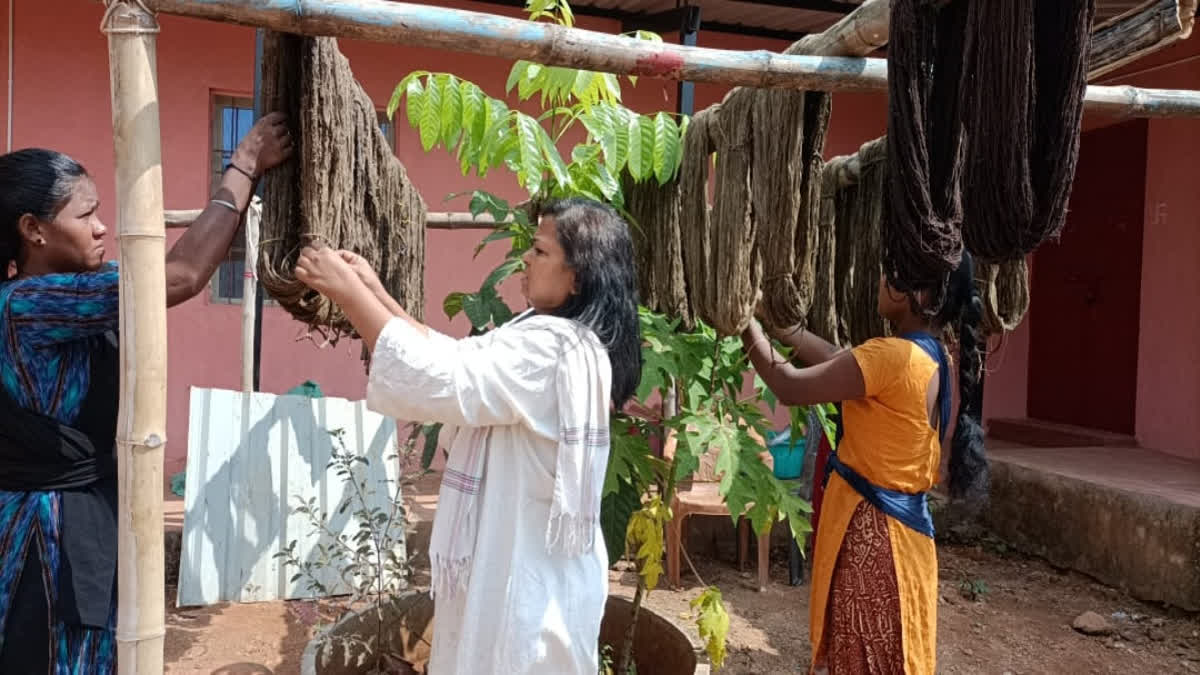Koraput: Koraput, a picturesque district known for its rich tribal culture and lush forests, is set to carve a niche in the field of natural dye production. The region, with its unique ecological and cultural heritage, is being transformed into a hub for sustainable fabric production through the innovative efforts of Folk Weaves, an all-women initiative.
According to Dr. K. Anuradha, director of Folk Weaves, this initiative is aimed at empowering local women while preserving the vibrant cultural legacy of Koraput. “Hundreds of women from Boipariguda, Lamtaput, Nandpur, Kotpad, and Koraput blocks have been trained to extract natural dyes from local resources like tree barks, leaves, fruits, and flowers,” she said. This eco-friendly approach not only provides sustainable livelihoods but also protects the biodiversity of the region.
Women in Koraput Take the Lead in Natural Dye Making (ETV Bharat) The Challenge of Aal Trees
Koraput’s Kotpad area has long been renowned for its handwoven fabrics dyed using the roots of the Aal tree. These fabrics have reached international markets, celebrated for their deep, earthy hues. However, the limited availability of Aal trees has often disrupted production. Folk Weaves is addressing this challenge by training women to utilize a wide range of natural resources to create dyes, ensuring a steady supply for the textile industry.
Women in Koraput Take the Lead in Natural Dye Making (ETV Bharat) Empowering Women, One Thread at a Time
The impact of this initiative is most evident in the stories of women like Tilottama Majhi of Bagraguda village. Once a mental health patient, Tilottama found hope through SPREAD, an NGO that facilitated her recovery. Today, thanks to the opportunities provided by Folk Weaves, she is training in dye preparation and weaving, dreaming of financial independence.
Women in Koraput Take the Lead in Natural Dye Making (ETV Bharat) Similarly, Damai Chalan from Purunaguda village under Boipariguda block has emerged as a role model in her community. After undergoing years of training, she now dyes cotton, spins thread, and weaves fabrics on looms set up at the weaving center in Deula near Koraput. Her journey is inspiring other women to embrace this craft as a means of self-reliance.
Preserving Heritage Through Innovation
The Folk Weaves initiative has established a natural dye preparation and weaving center at Deula, which Dr. Anuradha hopes will become a cornerstone for preserving Koraput’s textile traditions. "Women from tribal communities like Dongaria Kondh, Paraja, Durua, and Gadaba are now creating 22 different fabric items using natural dyes derived from their indigenous methods. The organization also plans to expand its product range to cater to all age groups and markets," she said.
Women in Koraput Take the Lead in Natural Dye Making (ETV Bharat) A Dream Beyond Borders
For women like those in Boipariguda, who have traditionally worked in isolation, the initiative has ignited a new sense of hope. Dr. Anuradha revealed that a comprehensive plan is in place to supply these women with cotton threads and connect their products to national markets. “Our vision is to ensure that their skills are recognized and rewarded at the highest level,” she said.
Women in Koraput Take the Lead in Natural Dye Making (ETV Bharat) This transformation is not just about textiles; it’s about creating a sustainable ecosystem that blends ecological conservation with economic empowerment. By turning forest produce into vibrant fabrics, the women of Koraput are weaving a future filled with dignity and independence.
Read More
